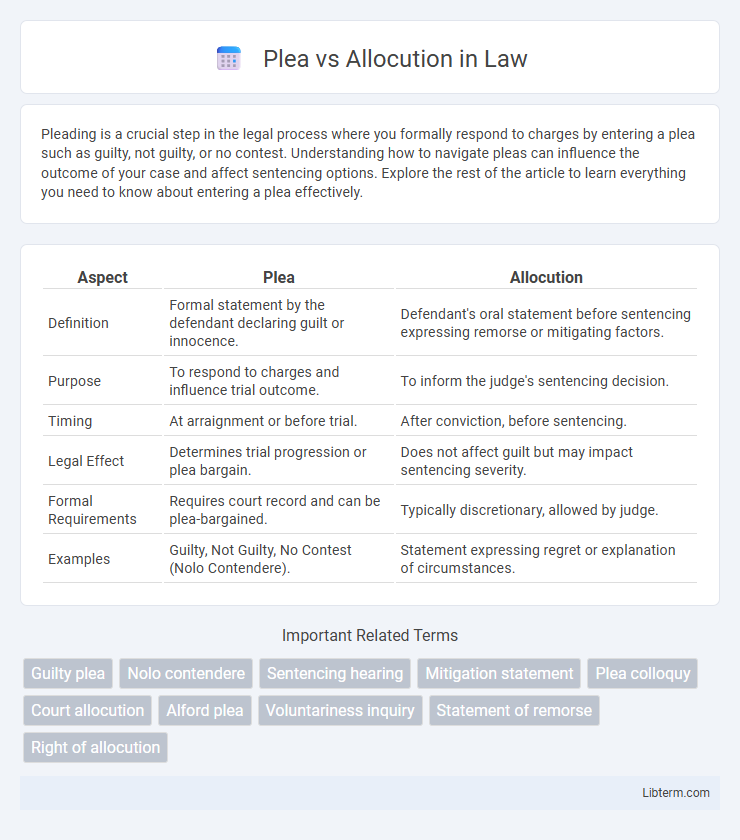Pleading is a crucial step in the legal process where you formally respond to charges by entering a plea such as guilty, not guilty, or no contest. Understanding how to navigate pleas can influence the outcome of your case and affect sentencing options. Explore the rest of the article to learn everything you need to know about entering a plea effectively.
Table of Comparison
| Aspect | Plea | Allocution |
|---|---|---|
| Definition | Formal statement by the defendant declaring guilt or innocence. | Defendant's oral statement before sentencing expressing remorse or mitigating factors. |
| Purpose | To respond to charges and influence trial outcome. | To inform the judge's sentencing decision. |
| Timing | At arraignment or before trial. | After conviction, before sentencing. |
| Legal Effect | Determines trial progression or plea bargain. | Does not affect guilt but may impact sentencing severity. |
| Formal Requirements | Requires court record and can be plea-bargained. | Typically discretionary, allowed by judge. |
| Examples | Guilty, Not Guilty, No Contest (Nolo Contendere). | Statement expressing regret or explanation of circumstances. |
Introduction to Plea and Allocution
Plea and allocution are key components in criminal proceedings, each serving distinct functions. A plea is the defendant's formal response to criminal charges, such as guilty, not guilty, or no contest, influencing the course of the trial. Allocution refers to the defendant's opportunity to speak directly to the court before sentencing, allowing them to express remorse or provide mitigating information.
Defining Plea in Criminal Proceedings
A plea in criminal proceedings is a formal statement made by the defendant responding to the charges, typically categorized as guilty, not guilty, or no contest. It serves as the defendant's official admission or denial of the alleged offense and determines the course of the trial or sentencing phase. Pleas streamline the judicial process by potentially avoiding a full trial when defendants accept responsibility for the crime.
Understanding Allocution in Court
Allocution in court refers to the defendant's opportunity to speak directly to the judge before sentencing, allowing them to express remorse, explain circumstances, or request leniency. Unlike a plea, which is a formal statement of guilt or innocence, allocution is a personal statement that can influence the judge's sentencing decision. Understanding allocution is crucial for defendants to present mitigating factors and humanize their case beyond the legal facts.
Purpose and Importance of a Plea
A plea is a formal statement made by a defendant in court, indicating guilt, innocence, or no contest, and serves as the foundation for how a case proceeds in the judicial system. The primary purpose of a plea is to resolve criminal charges efficiently, potentially leading to a negotiated sentencing or dismissal of charges, which helps conserve court resources and reduces trial time. Pleas are crucial because they can influence sentencing outcomes and allow defendants to accept responsibility while potentially receiving reduced penalties.
Purpose and Importance of Allocution
Allocution serves as the defendant's formal opportunity to address the court before sentencing, allowing for personal expressions of remorse, explanation, or mitigating circumstances that may influence the judge's decision. Unlike a plea, which establishes the defendant's stance on charges, allocution emphasizes the human aspect by giving the defendant a voice to potentially sway the severity of the punishment. The purpose and importance of allocution lie in ensuring fairness and individualized justice within the sentencing process.
Legal Differences Between Plea and Allocution
A plea is a formal statement made by a defendant in court, typically admitting guilt, innocence, or no contest, which directly influences the course of the criminal proceedings. Allocution, on the other hand, is the defendant's opportunity to personally address the court before sentencing, allowing them to express remorse, explain circumstances, or request leniency, but it does not alter the established plea. While pleas determine the judicial outcome regarding guilt, allocution serves as a procedural right aimed at humanizing the defendant and potentially influencing sentencing decisions.
Impact on Sentencing: Plea vs Allocution
Plea bargaining often results in reduced charges or lighter sentences by demonstrating the defendant's acceptance of responsibility, which can influence the court's sentencing decision. Allocution allows defendants to personally address the court before sentencing, providing context or expressing remorse that may sway the judge toward leniency. While plea agreements shape sentencing outcomes through negotiation, allocution offers a final opportunity to impact the sentence via direct, emotional appeal.
Rights of Defendants During Plea and Allocution
Defendants maintain critical rights during plea and allocution, including the right to be informed of the charges and potential penalties before entering a plea and the right to remain silent to avoid self-incrimination during allocution. They have the right to effective legal counsel to guide them through plea negotiations and ensure any plea is made voluntarily and knowingly. During allocution, defendants can address the court directly to express remorse or provide mitigating circumstances, which can influence sentencing decisions.
Common Misconceptions About Plea and Allocution
Many believe plea and allocution are interchangeable terms, but a plea is a defendant's formal answer to charges, while allocution is a defendant's opportunity to speak before sentencing. Misconceptions often arise from confusing a guilty plea with allocution, which occurs after conviction and allows for remorse or explanation. Understanding this distinction clarifies the different legal functions and rights involved in each process.
Conclusion: Choosing Between Plea and Allocution
Choosing between plea and allocution hinges on legal strategy and case specifics, as a plea directly affects the charges and potential sentencing outcomes, whereas allocution offers an opportunity for defendants to personally address the court before sentencing. Pleas can expedite resolution through negotiated agreements, while allocution provides a platform to express remorse or explain circumstances, potentially influencing the judge's sentencing decision. Understanding the distinct legal implications and timing of pleas versus allocutions is crucial for defendants aiming to optimize case outcomes.
Plea Infographic

 libterm.com
libterm.com